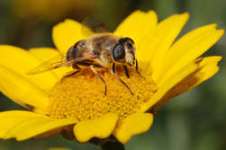 Michael Garratt, from School of Agriculture, Policy and Development, tells us why we should care about insects as National Insect Week approaches.
Michael Garratt, from School of Agriculture, Policy and Development, tells us why we should care about insects as National Insect Week approaches.
Since I picked up my first ladybird as a child, insects have fascinated me. Now 25 years on I am a professional entomologist. This is fun to research and worthwhile, especially encouraging the public to realise how important insects really are. During my MSc, my PhD and working at the University of Reading I have been lucky enough to be involved in outreach projects and activities that get the public interested in scientific research. When chatting to adults and children alike, I invariably get asked those dreaded questions! “What is the point in wasps?”, “Why do we have flies?”, “What are beetles for?”. I could give the facetious answer to this question by saying “What is the point in humans?”, but other than maybe getting an eight year -old to question their existence, this does little to answer the question.
I have worked on projects related to agricultural pest insects, including aphids infesting barley and caterpillars eating cabbages, and their existence, in any human terms, are hard to justify. So to avoid being too philosophical, my usual response to these tough questions typically referred to an insect’s place in the ecosystem, the complex interactions between species and their role in food webs. My current role at the University of Reading, however, sees me working on crop pollination by insects and I am delighted to say the answers to these questions are now far easier!
Insect, including bumblebees, solitary bees, honey bees and hoverflies, help pollinate 84% of European crop species. Recent research at Reading has shown that the service these insects provide is worth at least £510m to UK agriculture. Crops pollinated by insects include fruit like apples and strawberries and field crops such as beans and oilseed rape. Clearly the importance of pollinating insects cannot be overstated – they provide much of our food. Here comes the bad news: many species upon which we rely for pollination are showing widespread declines in abundance and diversity. In the UK in recent decades we have seen some bumblebee species become less widespread and both solitary bee and hoverfly diversity has fallen. Furthermore, the number of honey bee hives kept in the UK halved between 1985 and 2005. Despite their importance to UK agriculture, there are still many unknowns in insect crop pollination research, including which pollinators are actually important for pollinating many crops and how best we can manage farmland to support healthy and effective pollinator communities.
The University of Reading is part of a major UK research programme called the Insect Pollinators Initiative, aimed at understanding and addressing the decline in pollinating insects. The University is involved in several projects in this programme. I and my team are working on ‘Sustainable pollination services for UK crops’. We have been gathering data on the importance of pollinating insects to common crops, including apples, strawberries, beans and oilseed rape. We are now starting to understand the true importance of insect diversity to food security and their contribution to crop yield and quality. Importantly we will be testing how best we might mitigate against pollinator losses or try and arrest the declines all together. As part of any research project today it has become increasingly important to make results more accessible to the public and policymakers – this is not just an issue for researchers but for wider society. With the advent of National Insect Week, this provides us with an invaluable opportunity to ‘spread the word’ and get the public behind us.
National Insect Week is led by the Royal Entomological Society and in 2012 begins on the 25 June. Hundreds of events will be running across the country from butterfly walks to public lectures at venues such as the Oxford University Natural History Museum and the University’s own Harris Gardens. Our research team will be attending lots of events with our crop pollination roadshow and I encourage everyone to come along. After all, with public support comes financial and political support and we can then start securing crop pollination services for future generations!
For further information on National Insect Week or our research at the University of Reading see links below or contact me on M.P.Garratt@reading.ac.uk.


